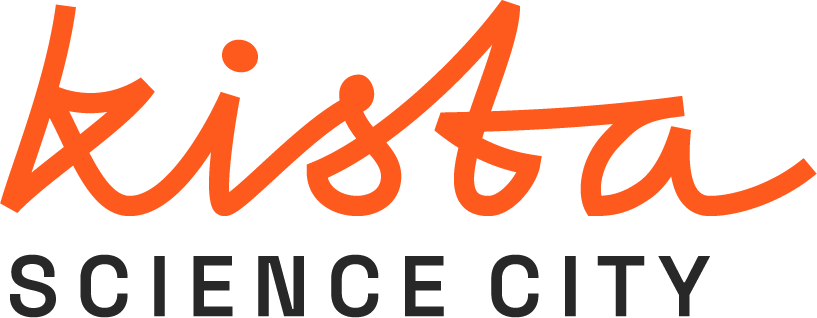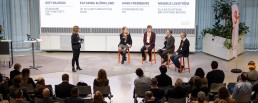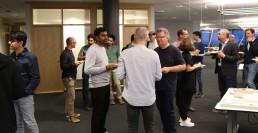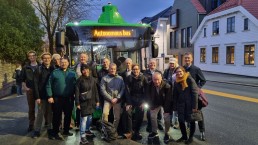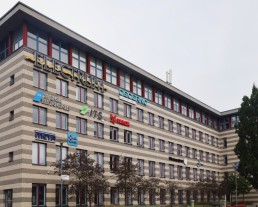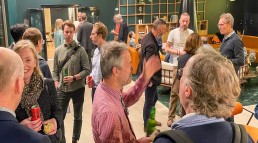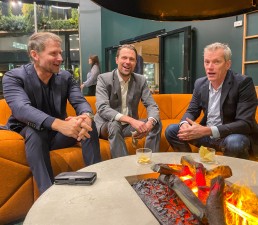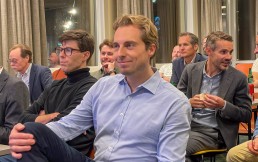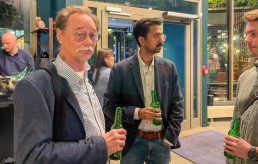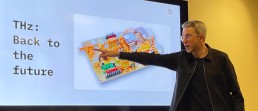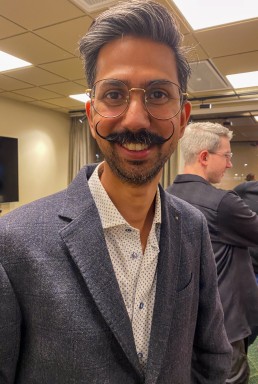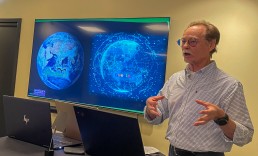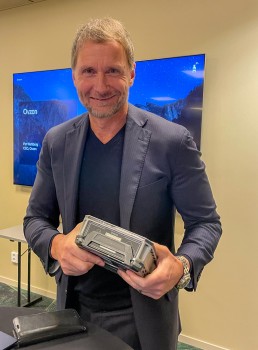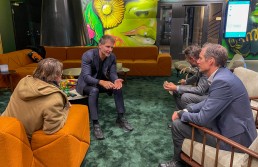Civil tech to power up defence
Civil tech to power up defence
With global security challenges on the rise, the integration of new technologies into the defense sector has become a priority for Sweden. Central to this initiative is the effort to bridge the gap between the civil sector’s technological solutions and the defense industry’s specific needs. Sweden’s rich ecosystem of startups and scaleups is increasingly recognized as crucial to strengthening Sweden’s framework as these companies offer groundbreaking innovations and fresh perspectives that help navigate the challenges of modern security threats.
Bridging civil and defence sectors
Shared visions and increased collaboration between the civil and defence sectors are key. There is a pressing need to close the gap that has been widening between these sectors, and actors across the spectrum call for a more integrated approach. The synergy of civil sector innovation and defence expertise safeguards national security.
A tradition of innovation
Sweden’s role as a pioneer in technological innovation is a strategic asset in its defence policy. As security concerns increase, we must ensure that Sweden remains at the forefront of defence technology, ready to meet the challenges of tomorrow. This includes investing in research and development, encouraging cross-sectoral knowledge exchange, and creating an environment where innovative ideas can flourish and be rapidly deployed.
The role of startups and scaleups
Startups and scaleups are essential partners in driving technological advancements in the defence sector. Their agility, innovative approaches, and groundbreaking technologies are critical for enhancing Sweden’s defence capabilities, making their involvement essential for the nation’s security framework. To boost this involvement, there is a need for supportive frameworks that facilitate these partnerships, including funding mechanisms, regulatory support, and platforms for collaboration.
Insights from the Swedish Minister for Defence
At a recent event on Defense and Innovation, Swedish Minister for Defence, Pål Jonson, stressed the critical need for innovative solutions amidst growing security challenges in Sweden and Europe. Jonson acknowledged the civil sector’s significant role and potential in enhancing Sweden’s defence through technology and innovation. He also emphasized the government’s desire for more coordinated efforts in innovation and for lowering the barriers for new companies to contribute to the defence sector.
The event brought together a mix of cutting-edge startups and scaleups, and decision-makers to explore the potential of civil sector innovations in meeting defence needs.
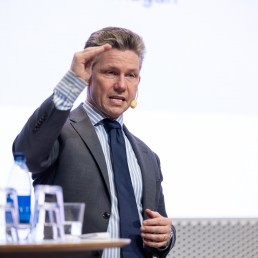
The minister directly addressed startups and scaleups: “I’m here today because I need your help. We want to work more with you, and we need to make this journey together to make Sweden safer, now and in the future” the minister stressed.
Partnering for a secure future
Collaboration, innovation, and a shared commitment to security are vital for tech companies and the defence sector alike. By embracing these principles, Sweden and Europe can navigate modern security challenges, ensuring a safer tomorrow.
This discussion underscores a collective ambition to not only address current security challenges but also work proactively to prepare for the future. Central to these efforts is the role of startups and scaleups, whose groundbreaking innovations are key to driving Sweden’s technological advancements in defence.
However, this requires an ecosystem that supports innovation and new partnerships, ensuring accessible funding, supportive policies, and platforms that foster cross-sectoral collaborations. The way forward is marked by collaboration, innovation, and a shared commitment to national and global security.
New funding and collaboration opportunities
Sweden and Europe are responding to the need for defense innovation by introducing several key funding and collaboration opportunities. These efforts aim to engage startups and scaleups, empowering them to bring innovative solutions to the defense sector. By focusing on these companies, the goal is to make the defense industry more dynamic and responsive to evolving security needs.
Some of these initiatives are:
European Defence Fund (EDF)
A European Commission initiative, aimed to support collaborative defence projects. It focuses on funding the development of small and medium enterprises (SMEs) at various stages, from research to market deployment.
NATO Innovation Fund (NIF)
Aimed at enhancing NATO’s innovation ecosystem, NIF supports deep tech innovations in science, technology, engineering and mathematics (STEM). It facilitates the commercialization of technologies vital for the Alliance’s security by addressing the funding gap in the market.
DIANA (NATO)
An acceleration program and network of test centers connecting startups with end users, scientists, and integrators to promote the development of dual-use deep tech solutions for NATO.
Säkerhets- och försvarsföretagen (SOFF)
A trade association for the security and defence industry in Sweden. SOFF works to improve market access and trade opportunities for companies within the sector, fostering a competitive business environment.
SME-D
As a network and knowledge hub, SME-D promotes collaboration, competence development, and experience exchange. Its goal is to enhance the competitiveness of its members and ensure the continuous supply of skills in the industry.
Safety in the digital age
Safety in the digital age
Perceived safety is a growing concern in cities across Sweden. As urban populations grow and environments become more complex, these challenges underscore the importance of creating secure, inclusive spaces for all residents. New technologies and models for collaboration offer key solutions to understanding and addressing these issues. This evolving landscape presents a prime opportunity for small tech companies to play a role in developing smart city solutions.
In 2023, the Safety Lab (Trygghetslabbet) served as a platform for municipalities, companies, and researchers to collaborate and explore innovative methods.
Several activities and initiatives took place within the Safety Lab framework and this article highlights two.
IMY pilot measuring public safety
This collaborative pilot investigated grey areas in data protection regulations, aiming to improve public sector efficiency and service while protecting citizen rights and privacy. The project, involving Kista Science City, IMY, IoT Sverige, and the City of Stockholm (Trafikkontoret), utilized LiDAR sensors to assess the effectiveness of safety measures by measuring movement in public spaces.
The “regulatory sandbox” format guides in interpreting and applying data protection regulations and opens doors for small tech companies to navigate complex regulations. This investigative and dialogue-based approach offered valuable learning and sharing opportunities for participating tech companies and stakeholders. The final report facilitates further understanding and serves as a reference for future projects navigating complex technology and legal grey areas.
Forum for urban safety with IoT
A series of workshops, aimed to accelerate learning and problem-solving through collaboration, focusing on leveraging Internet of Things (IoT) technologies to address urban safety concerns with a specific interest in ethics and integrity. These sessions brought together diverse stakeholders to brainstorm, share insights, and pilot innovative solutions directly impacting urban safety and community well-being. Nationellt forum för trygget i stadsrummet
Lucas Uhlén, project leader at Kista Science City, explains: “Our workshops were designed to initiate a testing environment where the focus was on how IoT can enhance the feeling of safety. By bringing together various actors, we sought to enhance our understanding of how innovative solutions can contribute to a safer, more appealing society.”
Uhlén further emphasizes the importance of early legal inclusion: “Engaging with legal experts from the start ensured our initiatives were grounded in respect for privacy, setting the course for this initiative but also setting an example for future projects.”
A model for the future
The Forum’s inclusive and forward-thinking approach complements traditional project methods. Integrating various stakeholders and legal considerations from the outset offers a valuable strategy for responsible and inclusive innovation across different sectors.
The Forum has laid the groundwork for future innovations, demonstrating the importance of collaboration, foresight, and a commitment to ethical principles in the pursuit of public safety.
Opportunities for businesses
The needs-based pilots in the Safety Lab have opened doors for small tech companies to break new ground. By understanding the public sector’s needs, participating in pilots, and actively engaging with stakeholders, companies can unlock valuable opportunities.
- Gain early insight: Gain crucial knowledge about the market framework and stay ahead of the curve by understanding evolving needs.
- Influence the market: Actively participate in pilots to shape future regulations and standards, ensuring your voice is heard in shaping the industry’s direction.
- Drive market growth: Contribute to the overall growth of the IoT and public safety market through your innovative solutions, fostering a safer and more secure future for communities.
Read the report Trygghet-i-stadsrummet to learn more about the projects and how innovative solution are shaping safer urban environment.
Computer and System Architecture meetups
The CaSA meetups: Building bridges in computer and system architecture
The Computer and System Architecture (CaSA) Meetup series has emerged as a key hub for bridging minds in the field. Organized by Jonas Svennebring, Jakob Engblom, and Magnus Karlsson, this initiative is gearing up for its third gathering in Kista this March. The Meetup series stands out not just for its focus on deep technical discussions, but for its commitment to fostering a community spirit where ideas and innovations thrive.
Inspiration and objectives
Jonas Svennebring, Principal Engineer at Intel Corporation and one of the founding members, shared the origins of the CaSA Meetup series:
– The inspiration comes from a popular Linux conference in Paris called Kernel Recipes where a limited number of participants gather in a relaxed setting to talk about tech and eat good food. We liked all aspects of this and thought it would be great to have something similar locally. A smaller, regular event near work seemed perfect for us.
CaSA Meetup is about bringing together like-minded individuals to share knowledge, discuss emerging trends, and, importantly, enjoy good company. Svennebring points out that while the organizers are all employed at Intel, CaSA is a personal initiative driven by a shared passion for technology. The meetups serve as a platform to step out of one’s technological niche and explore the dynamic landscape of innovations within computer and system architecture.
The format
The format of CaSA Meetups is designed to maximize interaction and engagement. Svennebring explains:
– What we have tried so far, and that seems to work very well, is starting with two presentations of about 30 minutes each, followed by a break for networking and snacks. This setup naturally encourages participants to discuss the presentations just witnessed and build upon them. We then rejoin for a Q&A session with the presenters. Having had time to break the ice, participants often engaged in lively discussions. The underlying idea is to help attendees meet, form new connections, and exchange ideas. While presentations are crucial, the discussions they spark are equally significant.
The CaSA Meetups have proven to be an effective platform for lively discussions, with attendees keen to return for more. This enthusiasm underscores the success of the event’s format, which is curated by Jonas and the organizing team. Their focus is on fostering an environment that encourages open dialogue and collaboration among professionals from both industry and academia. By managing the size of the meetups, they ensure each event remains a place for meaningful engagement, preserving the series’ blend of intimacy and interactivity.
The Kista spirit
Choosing Kista as the venue for CaSA Meetups was a natural decision for the organizers. Apart from its accessibility and the organizers’ professional ties to the area, Svennebring highlights Kista’s vibrant tech ecosystem as a key aspect right from the start.
– There was never any doubt that we would go for Kista. There’s so much interesting tech development going on in the area, and we already have strong connections to companies and innovators here. Our collaboration with Kista Science City has been crucial for getting started. Working with Mikaela Färnqvist has been very smooth. It’s also nice to be able to hold the meeting high up in the Kista Science Tower (thanks Vasakronan!). It really adds a special atmosphere to the meetings.
Join CaSA Meetup #3 in March!
On March 13, the CaSA community will meet again, this time to delve into the theme of RISC-V. “We have two really exciting speakers, so it promises to be an engaging session. This area has received a lot of attention in recent years but also presents significant challenges. As always, we look forward to the enjoyable discussions over drinks and snacks that have become the trademark of our meetups!” says Svennebring.
📅 March 13
🕒 17:00 – 21:00
📍 Kista
Are you interested in the cutting edge of computer and system architecture? CaSA Meetup #3 in March is your opportunity to join a community of like-minded individuals who are all about sharing knowledge, sparking innovative discussions, and building connections in a relaxed and welcoming environment.
Don’t miss out – Sign up today! >> Computer and Systems Architecture meetup – Kista Science City
Bringing ideas to life in Kista
Do you have an idea for an event or a community initiative that could enrich the Kista ecosystem? Kista Science City offers support to turn your vision into reality. Reach out to us, and let’s make it happen together!
Survey: Help us shape cybersecurity support initiatives for Swedish tech businesses
As a tech professional, you understand the critical role of cybersecurity in safeguarding your company’s digital assets. Now, you have the chance to directly influence the support initiatives that will equip you to create secure products and solutions.
Take just 3 minutes to complete our survey and help us understand your specific cybersecurity needs and challenges.
The survey is a part of the research conducted by Sweden Secure Tech Hub, an initiative that creates activities and offerings in the field of cybersecurity for small and medium-sized tech companies.
By responding to the survey, you help us help you. The input will serve as the foundation for the types of investments we, as Science Park, need to make to support your company.
Sweden Secure Tech Hub will offer a variety of resources and services, ranging from lectures, webinars, expert assistance, testing opportunities, and help in finding the necessary funding for planned development initiatives. Some of these activities are already underway, such as open meetings within the Cyberly network, where you can gain inspiration and support.
Sweden Secure Tech Hub is a national innovation hub in the field of cybersecurity and is a collaboration between six of Sweden’s leading Science Parks: Linköping Science Park, Lindholmen Science Park (Gothenburg), Ideon Science Park (Lund), Kista Science Park (Stockholm), Luleå Science Park, and Blue Science Park (Karlskrona).
Your voice matters. By completing the survey, you’re actively shaping the future of cybersecurity for Swedish tech companies. Together, we can create a secure and thriving tech ecosystem that empowers innovation and growth.


Sweden ICT, the organization behind Sweden Secure Tech Hub, is a collaboration between six of Sweden’s leading science parks in tech and digitalization: Linköping Science Park, Lindholmen Science Park (Västsverige), Ideon Science Park (Lund), Kista Science City (Stockholm), Luleå Science Park, and Blue Science Park (Karlskrona). Together, we represent an ecosystem with over 2,400 companies and 59,000 employees.
Sweden Secure Tech Hub has been designated by the EU as a European Digital Innovation Hub (EDIH) and has been tasked with supporting and strengthening companies and society in their secure digitalization efforts.
The work is funded by the European Regional Development Fund, Tillväxtverket, and Region Blekinge, in collaboration with the participating partners.
If you want to learn how to take part of upcoming activities, please contact:
Karin Bengtsson, CEO, Kista Science City
Email: karin.bengtsson@kista.com
Emma Sturesson, Project Manager, Blue Science Park
Email: emma.sturesson@bluesciencepark.se
Applied Autonomy establishes Swedish hub
Applied Autonomy establishes Swedish hub
Applied Autonomy, known for innovative work in autonomous transportation, has chosen Kista as a strategic hub for their Swedish operations. This decision marks an important step in the Norwegian company’s expansion and commitment to grow within the Swedish market.
Swedish base
Choosing Kista as a Swedish hub reflects Applied Autonomy’s commitment to being closer to key partners and to becoming part of the dynamic tech landscape in the area. CEO Olov Medland shares his perspective on this strategic decision:
– Kista’s unique combination of technological expertise and collaborative culture made it an ideal choice for us. We are excited about being part of this tech community, contributing to and benefiting from the synergies it offers.
Applied Autonomy is positioned to play a significant role in the evolving landscape of urban transport in Stockholm and Sweden. The company is enthusiastic about sharing its insights and experiences in autonomous transport and collaborating with other companies and innovators in this field. “The possibilities are endless, and we’re eager to explore them,” says Medland.
5G Ride
Applied Autonomy has recently joined the 5G Ride project. Central to their contribution is the xFlow® platform, an innovative solution that ensures a seamless link between vehicles, operators, and end-users, thereby enabling safe and efficient transport. Medland emphasizes the importance of this project:
– Joining 5G Ride was a natural decision for us. The project aligns perfectly with our capabilities, including xFlow®, and our commitment to shaping the future of autonomous transportation. Our participation in this innovative project is an excellent opportunity to demonstrate how our technology can be integrated into existing urban transport systems, enhancing safety, efficiency, and overall user experience.
Cross-border dialogue on autonomous public transport
In November 2023, the 5G Ride project partners from Ericsson, RISE, & Kista Science City, in collaboration with Drive Sweden Policy Lab, Trafikverket, and Transportstyrelsen visited Stavanger, Norway, to observe a full-scale autonomous bus in a real urban setting. This visit allowed the teams to witness the operation of a self-driving, full-scale bus navigating complex urban conditions, including traffic lights, roundabouts, lane changes, and a tunnel, at speeds of up to 40 km/h.
Observations from Stavanger
The primary objective of the Norway trip was to discuss and understand the challenges and opportunities of advanced pilot projects in autonomous public transport. The discussions highlighted the importance of close collaboration between different stakeholders – including tech developers, public transport authorities, and regulatory entities – to drive progress in this complex field. This approach is crucial for combining expertise, sharing insights, and aligning efforts towards common goals in autonomous transportation. Additionally, local Norwegian partners emphasized the value of continual development, focusing on real-world testing of these systems to enhance safety and efficiency in urban mobility.
A key topic during the Stavanger visit was the comparison of the regulatory environments for autonomous vehicle testing in Sweden and Norway. Each country’s approach to regulations and funding for research projects has significant affect for the development of autonomous transport solutions. This highlighted the importance of adaptable regulatory frameworks in supporting advancement and innovation within this field.
Applied Autonomy
The visit to Norway was hosted by Applied Autonomy, a new partner in the 5G Ride project. As a company specializing in software solutions for autonomous transportation, Applied Autonomy brings crucial expertise to the project. Their involvement is expected to enhance the project’s capabilities, particularly in terms of scalable and adaptable autonomous solutions. This partnership marks a big step in the collaborative effort to develop and implement advanced autonomous transport systems.
In addition to Applied Autonomy, the Norway visit saw participation from several organizations, including Adastec, Vy, and Kolumbus, along with representation from Statens vegvesen. Each of these organizations contributed to the success of this trip, bringing unique perspectives and expertise to the discussions and demonstrations.
Future Directions
Looking ahead, the 5G Ride project plans for new demo days and test with autonomous vehicles in Stockholm in 2024. As the project enters its next phase, the project remains committed to leveraging international learnings and local expertise to revolutionize urban mobility. The combined efforts are key in our journey towards a more connected and sustainable future in public transportation.
Internship opportunities
Internship opportunities
The collaboration between academia and industry creates a rich environment for learning and innovation. As 2024 approaches, many ocompanies and organizations in Kista are welcoming interns across a variety of technological fields. These internships provide students with the opportunity to work with experienced professionals, apply their academic knowledge in practical settings, and contribute to meaningful projects. This is an ideal chance for students from diverse backgrounds to gain valuable experience and advance their academic and professional journeys.
Explore these opportunities and find a project that aligns with your interests and career goals:
RISE Research Institute of Sweden
At RISE, interns can delve into a range of projects within the realm of the Internet of Things (IoT) and big data analysis. From exploring the security of ultra-efficient UWB networks to unlocking the future of energy-efficient IoT and analyzing nationwide cellular network traffic, RISE offers a platform for interns to engage with key technological advancements.
For detailed information on all available projects, visit RISE’s internship page.
PandionAI
PandionAI invites interns to contribute to the development of AlertSat’s geospatial support. This project offers an opportunity to work on enhancing the user interface and data flow within the AlertSat Portal, a crucial tool for decision-making based on satellite data.
Munters
Munters is seeking a Master Thesis Student within its Controls & Connectivity team. The selected candidate will work on creating sustainable climate solutions, focusing on areas like control systems, automation, and IoT.
FOI (Swedish Defence Research Agency)
FOI in Kista is looking for interns to work on diverse projects ranging from virtual gamma spectroscopic labs to defense analysis and underwater network localization. With a broad spectrum of opportunities in areas like software development, data analysis, and policy research, FOI’s internships meet the needs of a variety of interests and skills.
For detailed information on all available projects, visit FOI’s internship offerings for 2024
Excillum
Excillum offers three distinctive Master’s thesis projects. These include exploring thermal drifts in x-ray sources, understanding the limits of diamond endurance under electron beams, and developing high-resolution x-ray laminography for imaging layered components. Each project at Excillum is a blend of practical experimentation and theoretical exploration.
The new semiconductor landscape
The new semiconductor landscape
As digitalization accelerates, semiconductors become ever more crucial. This article explores the expanding microchip industry in Europe, Sweden’s central role in this growth, and how Kista-based institutions are driving advancements in this dynamic field.
Semiconductors are the technological cornerstone of modern society. These micro components power everything from mobile phones and vehicles to IoT and defense technologies. They are also vital for advancing energy-efficient systems that support the global shift towards a sustainable future. As digital demands grow, so does the need for these electronic building blocks.
Europe’s challenges and Sweden’s response
Recognizing the need for growth, the European Union is now taking decisive steps to strengthen its semiconductor industries. Accounting for just 10% of the global microchip market, the recently initiated European Chips Act is set to boost Europe’s production and enhance technological competitiveness and resilience in the sector.
Within this ambitious framework, Sweden is emerging as a key contributor. Aligned with the European goals, the country’s national strategy aims not only to revitalize its own semiconductor production but also to effectively contribute to Europe’s technological independence. In the midst of this national and international push in microchip technology stands Kista Science City.
Mikael Östling, professor at KTH Royal Institute of Technology, highlights the importance of these efforts:
– The initiative creates a need to educate thousands of engineers and retrain already working professionals. KTH is well-equipped for this, with a strong tradition of research and education in the semiconductor field. However, success also requires collaboration between universities and new startups. With its strong innovation environment, lab infrastructure, and companies in the semiconductor field, Kista has an opportunity to take a strong position in this development.
Local innovation and global impact
Kista’s mix of established companies, agile startups, and academic institutions fosters an environment where semiconductor research and development thrive. The area is home to several key players driving advancements in this field, and at the forefront of these tech ventures are KTH Royal Institute of Technology and the Electrum laboratory. The individual as well as collaborative efforts of these institutions significantly contribute to the microchip evolution, in KIsta as well as on the global stage.
KTH Royal Institute of Technology
KTH is a dynamic and multifaceted force in semiconductor research. With a broad spectrum of activities, spanning both theoretical and applied aspects, they range from developing new semiconductor materials and technologies to enhancing the efficiency and performance of existing ones. These advancements are not limited to technical aspects but also include exploring sustainable practices in semiconductor manufacturing, aligning with Sweden’s commitment to sustainable practices and, not least, UN’s Sustainable Development goals.
The Electrum laboratory
Electrum is a world-renowned laboratory with state-of-the-art facilities that serves as a center for international semiconductor research and innovation. Here, industry professionals and researchers within areas like micro and nanofabrication are provided with the resources to experiment with and refine semiconductor technologies. Electrum’s dedicated efforts ensure that the semiconductors produced meet the highest standards of performance while also being sustainable and cost-effective.
The fusion of research and innovation
The collaboration between KTH and Electrum Lab exemplifies a crucial bridge between academic research and industrial application. This partnership stands as a successful model of academia-industry collaboration, blending KTH’s theoretical insights and Electrum’s practical applications. Together, they not only facilitate the transfer of knowledge from the lab to the market but also ensure that innovations in semiconductor technology are both pioneering and relevant to current industry needs.
Looking ahead
It is the synergy of academic expertise and industrial pragmatism that positions Kista as a leader in the semiconductor field. Institutions like KTH and the Electrum laboratory are not just contributing to the local tech ecosystem; they are playing a vital role in elevating Europe’s position in the global semiconductor industry. Their efforts underline the importance of strategic partnerships and a collaborative approach in driving technological progress.
As Kista continues to be a hotbed for semiconductor research and innovation, it establishes its place as a key player in shaping the future of technology both in Sweden and across Europe.
KTH:s verksamhet koncentreras till tre campus
KTH:s verksamhet koncentreras till tre campus
KTH:s styrelse har idag tagit beslutet att pga ekonomiska skäl koncentrera sin verksamhet till tre campus och därigenom lämna Kista.
Kista Science City respekterar beslutet men ser att det är tråkigt att man väljer att lämna ett så starkt ekosystem i en tid när Sverige behöver kraftsamla kring utvecklingen av ny teknik och lösningar för hållbarhet.
KTH är idag en viktig del av Kista och starkt bidragande till områdets utveckling. KTH:s avsikt är dock att arbeta vidare med partner på plats i Kista, utveckla nya modeller för samarbeten och gemensamma utvecklingssatsningar.
I nuvarande omlokaliseringsplan ingår inte Elektrumlaboratoriet, som är ett av Stockholms viktigaste forskningslaboratorier och drivs i dag av KTH/RISE.
Hur flytten ska gå till och mer detaljerade planer om när kommer utarbetas under 2024.
Mer information på KTH’s intranät.
The growing impact of space technology
The growing impact of space technology
Space tech is rapidly transforming our world, extending its reach beyond the cosmos to tackle pressing challenges on Earth.
One key area of impact is climate change, where space-based solutions can provide unprecedented data and insights to help us monitor and analyze changes in the atmosphere. Space technology is also opening new doors for business, enabling the development of new services and markets that were previously unimagined.
Get On Top Of™ Space Tech
At Get On Top Of™ Space Tech, arranged by THINGS and Kista Science City, experts from various Stockholm-based companies came together to share their insights on the rapidly evolving sector. This forum highlighted the enormous investments that are currently being made in space tech research and development, and how these are fueling cross-industrial innovation. Topics ranged from the current state and challenges of space technology to what the future holds and the opportunities that this development presents for businesses and society at large.
At the event, Christer Andersson, Chief Vision Officer and Co-Founder of PandionAI, emphasized the economic impact of space data:
– The value derived from space data, especially satellite data, is immense and serves as a driving force for the economy. The ability to anticipate and mitigate issues, such as avoiding floods and reducing uncertainty in supply chains, showcases the transformative power of space technology in addressing real-world challenges.
As the discussion explored the broader implications of space technology, it also highlighted Sweden’s strategic role in this expanding field. Per Wahlberg, Founder and Deputy CEO of Ovzon, said:
– With a growing focus on space as the new domain, Sweden finds itself well-positioned at the forefront, thanks in no small part to contributions from Swedish corporations.
